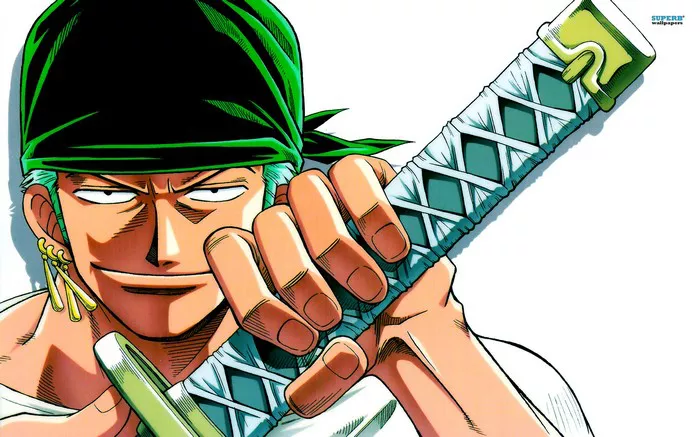Roronoa Zoro, one of the central characters in the popular manga and anime series “One Piece,” is renowned for his formidable swordsmanship and unwavering determination. As the swordsman of the Straw Hat Pirates, Zoro wields three swords simultaneously in a unique fighting style known as Santoryu or Three Sword Style. However, among the many questions surrounding his character, one intriguing mystery persists: is Roronoa Zoro left-handed? In this comprehensive analysis, we delve into the evidence, theories, and debates surrounding Zoro’s handedness to unravel the truth behind this enigmatic aspect of his character.
Roronoa Zoro
Character Overview
Roronoa Zoro, often referred to simply as Zoro, is a skilled swordsman and member of the Straw Hat Pirates, led by the series’ protagonist, Monkey D. Luffy. Known for his stoic demeanor, indomitable spirit, and insatiable ambition to become the world’s greatest swordsman, Zoro is a central figure in the “One Piece” narrative. Throughout the series, Zoro’s journey is marked by countless battles, personal growth, and unwavering loyalty to his captain and crewmates.
Three Sword Style
Zoro’s signature fighting style, known as Santoryu or Three Sword Style, involves wielding three swords simultaneously: one in each hand and a third clenched in his teeth. This unique and formidable technique showcases Zoro’s exceptional skill, agility, and mastery of swordsmanship. As he strives to fulfill his dream of surpassing his mentor and becoming the greatest swordsman in the world, Zoro’s Three Sword Style remains a defining aspect of his character.
The Debate: Is Zoro Left-Handed?
Evidence from the Series
The question of Zoro’s handedness has sparked debate among fans of “One Piece,” with conflicting evidence and interpretations complicating the issue. Some fans argue that Zoro demonstrates a preference for his left hand in certain scenes, suggesting that he may be left-handed. Examples cited include instances where Zoro is depicted holding a sword in his left hand or favoring his left side during combat.
Counterarguments
However, counterarguments have been raised to challenge the notion of Zoro’s left-handedness. Critics point out that Zoro is frequently depicted wielding swords in both hands interchangeably, suggesting ambidextrous tendencies rather than a clear preference for his left hand. Additionally, Zoro’s use of his left hand may be strategic or situational rather than indicative of inherent handedness.
Analyzing Zoro’s Swordsmanship
Ambidextrous Techniques
One interpretation of Zoro’s combat style is that he is ambidextrous, meaning he is equally proficient with both hands. Ambidextrous individuals have the ability to perform tasks with either hand interchangeably, allowing for versatility and adaptability in combat situations. Zoro’s mastery of swordsmanship may stem from his ambidextrous capabilities, enabling him to switch between hands fluidly during battles.
Strategic Considerations
Another perspective is that Zoro’s choice of hand in combat is driven by strategic considerations rather than inherent handedness. As a skilled swordsman, Zoro may deliberately alternate between hands to exploit weaknesses in his opponents’ defenses or execute complex techniques more effectively. His use of the left hand may be dictated by tactical advantages rather than a natural inclination.
Understanding the Artist’s Intent
Authorial Intent
Ultimately, the question of Zoro’s handedness may be best understood in the context of the author’s intent and artistic portrayal. Eiichiro Oda, the creator of “One Piece,” holds the ultimate authority over the depiction of characters and their attributes. While fans may offer interpretations and speculations, Oda’s vision for Zoro’s character prevails, shaping the narrative and defining key aspects of his personality and abilities.
Artistic License
As with many fictional characters, artistic license and narrative convenience may influence how Zoro’s handedness is depicted in the series. Oda may prioritize storytelling and visual aesthetics over strict adherence to realistic portrayals of handedness, opting for flexibility and creative freedom in character design and development.
The Role of Symbolism
Narrative Symbolism
In addition to practical considerations, Zoro’s handedness may hold symbolic significance within the narrative of “One Piece.” As a central character with a complex backstory and personal goals, Zoro’s actions and attributes often carry symbolic weight, reflecting themes of strength, determination, and resilience. Whether left-handed, right-handed, or ambidextrous, Zoro’s combat prowess and unwavering resolve remain central to his character arc.
Interpretive Freedom
Fans of “One Piece” may interpret Zoro’s handedness in various ways, drawing on personal insights and narrative clues to inform their understanding of his character. While authorial intent provides a guiding framework, individual interpretations offer creative freedom and foster engagement with the series’ richly layered storytelling.
Conclusion
The question of whether Roronoa Zoro is left-handed continues to intrigue fans of “One Piece,” sparking spirited debates and interpretations within the fandom. While conflicting evidence and perspectives complicate the issue, one thing remains certain: Zoro’s skill, determination, and unwavering loyalty to his captain and crewmates define him as one of the most beloved characters in the series. Whether left-handed, right-handed, or ambidextrous, Zoro’s legacy as a legendary swordsman and indomitable warrior endures, leaving an indelible mark on the world of “One Piece” and the hearts of fans worldwide.

